Search titles
Displaying results 101 to 110 of 223.

A New Era? »
Timor-Leste after the UN
Edited by: Sue Ingram, Lia Kent, Andrew McWilliam
Publication date: September 2015
Timor-Leste has made impressive progress since its historic achievement of independence in 2002. From the instability that blighted its early years, the fledgling democratic country has achieved strong economic growth and a gradual reinstatement of essential social services. A decade on in 2012, Presidential and Parliamentary elections produced smooth political transitions and the extended UN peacekeeping presence in the country came to an end. But significant challenges remain. This book, a product of the inaugural Timor-Leste Update held at The Australian National University in 2013 to mark the end of Timor-Leste’s first decade as a new nation, brings together a vibrant collection of papers from leading and emerging scholars and policy analysts.
Collectively, the chapters provide a set of critical reflections on recent political, economic and social developments in Timor-Leste. The volume also looks to the future, highlighting a range of transitions, prospects and undoubted challenges facing the nation over the next 5–10 years. Key themes that inform the collection include nation-building in the shadow of history, trends in economic development, stability and social cohesion, and citizenship, democracy and social inclusion. The book is an indispensable guide to contemporary Timor-Leste.

Strings of Connectedness »
Essays in honour of Ian Keen
Edited by: P.G. Toner
Publication date: September 2015
For nearly four decades, Ian Keen has been an important, challenging, and engaging presence in Australian anthropology. Beginning with his PhD research in the mid-1970s and through to the present, he has been a leading scholar of Yolngu society and culture, and has made lasting contributions to a range of debates. His scholarly productivity, however, has never been limited to the Yolngu, and he has conducted research and published widely on many other facets of Australian Aboriginal society: on Aboriginal culture in ‘settled’ Australia; comparative historical work on Aboriginal societies at the threshold of colonisation; a continuing interest in kinship; ongoing writing on language and society; and a set of significant land claims across the continent. In this volume of essays in his honour, a group of Keen’s former students and current colleagues celebrate the diversity of his scholarly interests and his inspiring influence as a mentor and a friend, with contributions ranging across language structure, meaning, and use; the post-colonial engagement of Aboriginal Australians with the ideas and structures of ‘mainstream’ society; ambiguity and indeterminacy in Aboriginal symbolic systems and ritual practices; and many other interconnected themes, each of which represents a string that he has woven into the rich tapestry of his scholarly work.

Long History, Deep Time »
Deepening Histories of Place
Edited by: Ann McGrath, Mary Anne Jebb
Publication date: August 2015
The vast shape-shifting continent of Australia enables us to take a long view of history. We consider ways to cross the great divide between the deep past and the present. Australia’s human past is not a short past, so we need to enlarge the scale and scope of history beyond 1788. In ways not so distant, these deeper times happened in the same places where we walk today. Yet, they were not the same places, having different surfaces, ecologies and peoples. Contributors to this volume show how the earth and its past peoples can wake us up to a sense of place as history – as a site of both change and continuity.
This book ignites the possibilities of what the spaces and expanses of history might be. Its authors reflect upon the need for appropriate, feasible timescales for history, pointing out some of the obstacles encountered in earlier efforts to slice human time into thematic categories. Time and history are considered from the perspective of physics, archaeology, literature, western and Indigenous philosophy. Ultimately, this collection argues for imaginative new approaches to collaborative histories of deep time that are better suited to the challenges of the Anthropocene. Contributors to this volume, including many leading figures in their respective disciplines, consider history’s temporality, and ask how history might expand to accommodate a chronology of deep time. Long histories that incorporate humanities, science and Indigenous knowledge may produce deeper meanings of the worlds in which we live.

Bougainville before the conflict »
Edited by: Anthony J Regan, Helga M Griffin
Publication date: August 2015
One of the most beautiful island groups of the Pacific, Bougainville has a remarkable history. Tragically, it is as the site of devastating civil conflict that Bougainville is perhaps best known.
In exploring the rich environmental, cultural and social heritage of Bougainville before the conflict, this collection provides an insight into the long-term causes of the crisis. In doing so, it surveys such topics as Bougainville’s prehistory and traditional cultures, the impact of German and Australian colonialism, the attempts by disparate local cultures to find a common identity, the assertion of political autonomy in the face of coercion to integrate with Papua New Guinea, and contemporary efforts to resolve conflict and plan a viable future.
A landmark collaboration between expert commentators on Bougainville and Bougainvilleans themselves, this volume provides a comprehensive picture for those seeking to understand Bougainville’s history and future directions.
Bougainville before the conflict was published in association with the State, Society and Governance in Melanesia Project, which is supported by The Australian National University and the Commonwealth of Australia.

Vietnam as if… »
Tales of youth, love and destiny
Authored by: Kim Huynh
Publication date: August 2015
Vietnam as if… follows five young people who have moved from the countryside to the city. Their dramatic everyday lives illuminate some of the most pressing issues in Vietnam today: ‘The Sticky Rice Seller’ explores gender roles; ‘The Ball Boy’ is all about the struggles of sexual and ethnic minorities; ‘The Professional’ examines relations between rich and poor; ‘The Goalkeeper’ delves into politics and ideology; and ‘The Student’ reflects upon family and faith. The stories also reboot several classics of Vietnamese literature for the twenty-first century, including ‘Floating Dumplings’ by feminist poet Ho Xuan Huong, Vu Trong Phung’s satire of French colonialism Dumb Luck, Nguyen Du’s epic account of fate and sacrifice ‘The Tale of Kieu’, and the proclamations of Ho Chi Minh. These novellas reveal the deepest sentiments of Vietnamese youth as they – like youth everywhere – come of age, fall in love and contest their destiny.
In 2011 Kim Huynh returned to Vietnam, having left more than three decades earlier. He had few plans other than to experience as much of his birthplace as possible. That year he came into contact with a wide range of people and took on many trades. Kim drank and dined with government officials, went on pilgrimages with corporate tycoons and marched in the streets against foreign aggression. He sold sticky rice, was a tennis player and also a ball boy, attended all manner of rituals and celebrations, eavesdropped on people in cafés and restaurants, and went back to the classroom as both a student and a teacher. Rich in detail and broad in scope, these tales capture Kim’s experiences and imaginings of Vietnam as if….
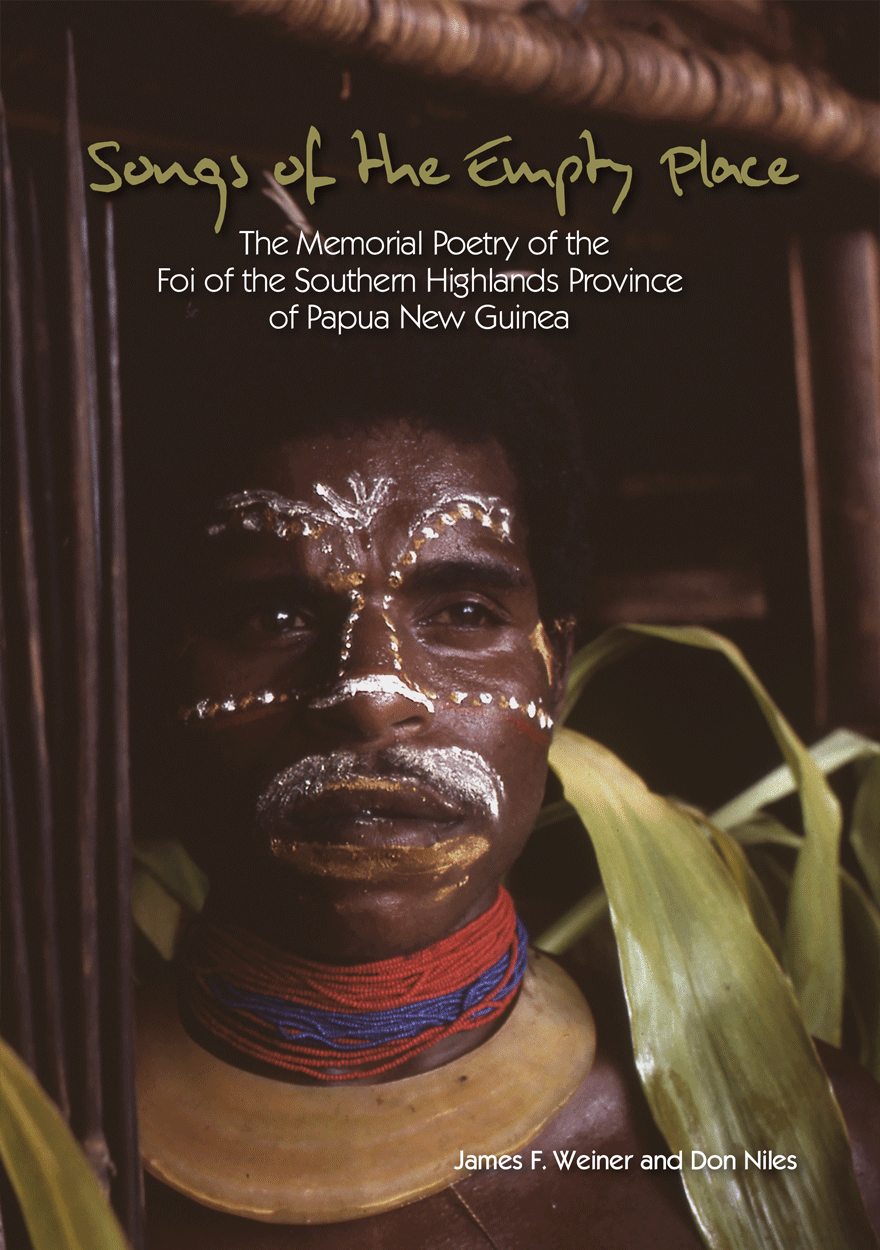
Songs of the Empty Place »
The Memorial Poetry of the Foi of the Southern Highlands Province of Papua New Guinea
Authored by: James Weiner, Don Niles
Publication date: July 2015
For 31 months between 1979 and 1995, James F. Weiner conducted anthropological research amongst the Foi people in Southern Highlands Province, Papua New Guinea. This book contains the transcriptions, translations, and descriptions of the songs he recorded.
The texts of women’s sago songs (obedobora), men’s ceremonial songs (sorohabora), and women’s sorohabora are included. Men turn the prosaic content of womenís sago songs into their own sorohabora songs, which are performed the night following large-scale inter-community pig kills, called dawa. While women sing sago songs by themselves, men sing their ceremonial songs in groups of paired men. Women also have their own ceremonial versions of such songs.
The songs are memorial in intent; they are designed to commemorate the lives of men who are no longer living. Most commonly they do so by naming the places the deceased inhabited during his lifetime.
These song texts and translations are introduced by Weiner. Ethnomusicologist Don Niles then brings together information about each type of song and considers these Foi genres in relation to those of neighbouring groups, highlighting aspects of regional performance styles. Consideration is also given to the poetic devices used in Papua New Guinea songs.
Eighteen recordings illustrating the Foi genres discussed in this book are available for download.
It remains uncertain how such songs may be affected by the major oil extraction project that has been undertaken in the region for more than two decades.
This book will interest students of anthropology, ethnomusicology, linguistics, verbal art, aesthetics, and cultural heritage.
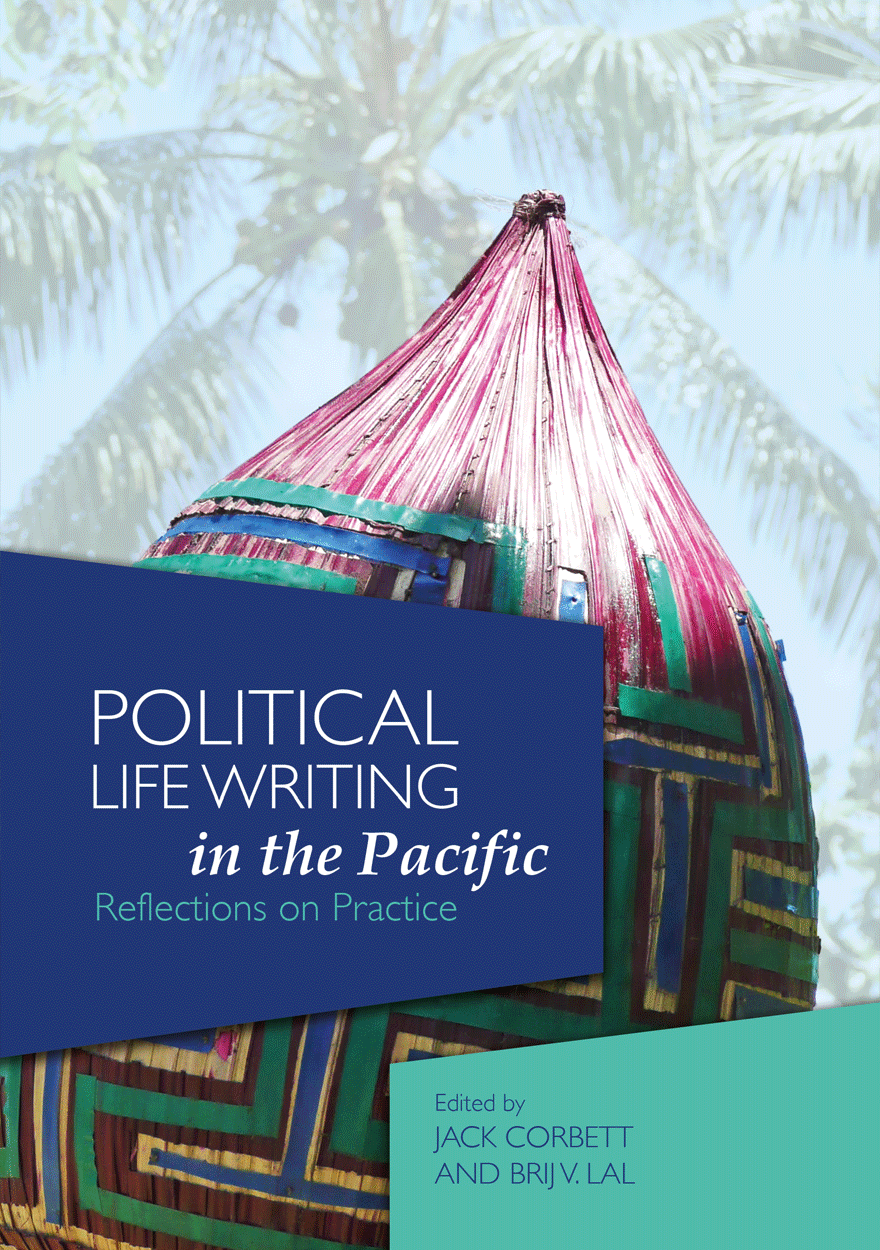
Political Life Writing in the Pacific »
Reflections on Practice
Edited by: Jack Corbett, Brij V. Lal
Publication date: July 2015
This book aims to reflect on the experiential side of writing political lives in the Pacific region. The collection touches on aspects of the life writing art that are particularly pertinent to political figures: public perception and ideology; identifying important political successes and policy initiatives; grappling with issues like corruption and age-old political science questions about leadership and ‘dirty hands’. These are general themes but they take on a particular significance in the Pacific context and so the contributions explore these themes in relation to patterns of colonisation and the memory of independence; issues elliptically captured by terms like ‘culture’ and ‘tradition’; the nature of ‘self’ presented in Pacific life writing; and the tendency for many of these texts to be written by ‘outsiders’, or at least the increasingly contested nature of what that term means.
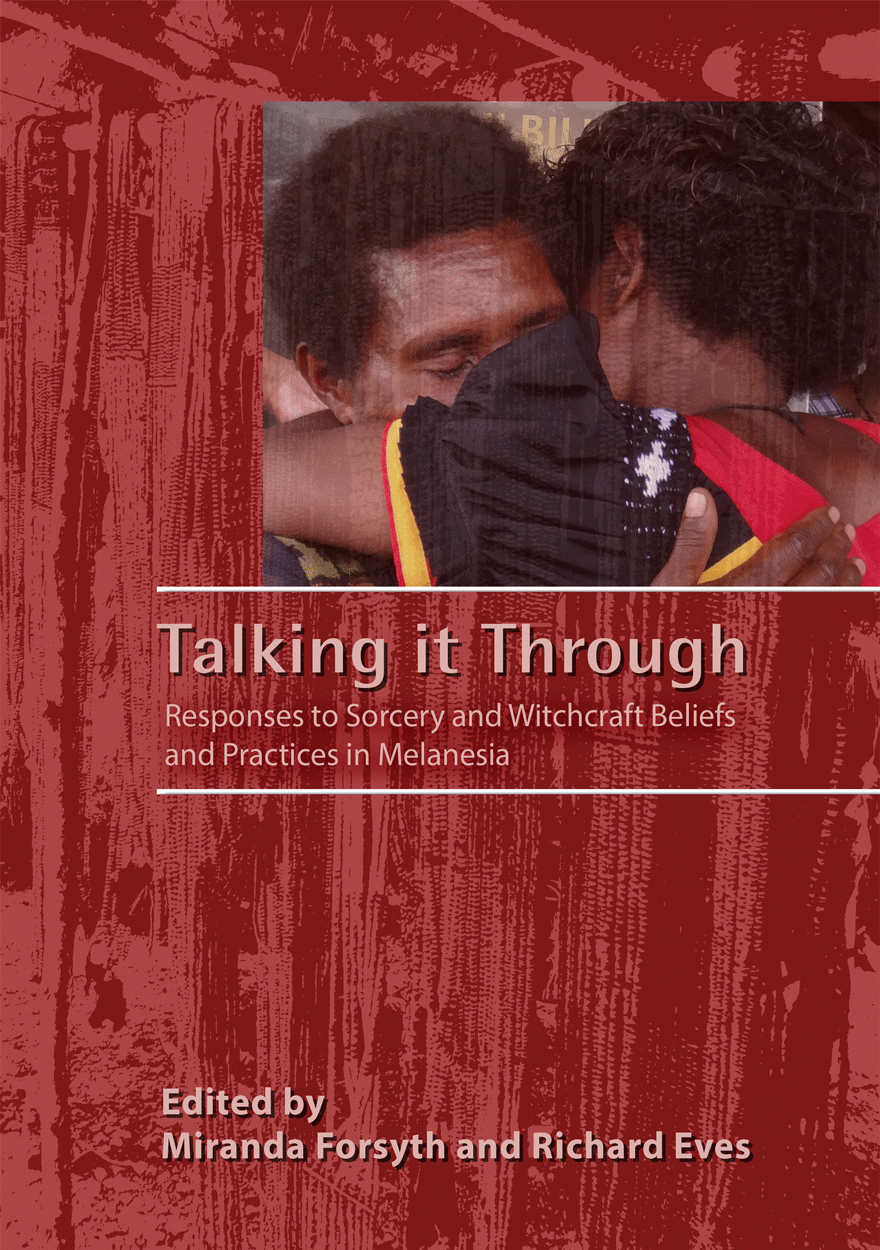
Talking it Through »
Responses to Sorcery and Witchcraft Beliefs and Practices in Melanesia
Edited by: Miranda Forsyth, Richard Eves
Publication date: May 2015
Sorcery and witchcraft practices and beliefs are pervasive across Melanesia. They are in part created by, and give rise to, a wide variety of poor social and developmental outcomes. These include uneven economic development, low public health, lack of social cohesion, crime, fear and insecurity. A further very visible problem is the attacks on men and women who are accused of being practitioners of witchcraft or sorcery, which can lead to serious bodily harm, banishment and sometimes death. Today, many communities, individuals, church organisations and policymakers in Melanesia and internationally are exploring ways to overcome the negative social outcomes associated with witchcraft and sorcery practices and beliefs. This book brings together a collection of chapters written by a diverse range of authors, both Melanesian and non-Melanesian, providing crucial insights both into how these practices and beliefs are playing out in contemporary Melanesia, and also the types of interventions that are being trialled or debated to address the problems associated with them.
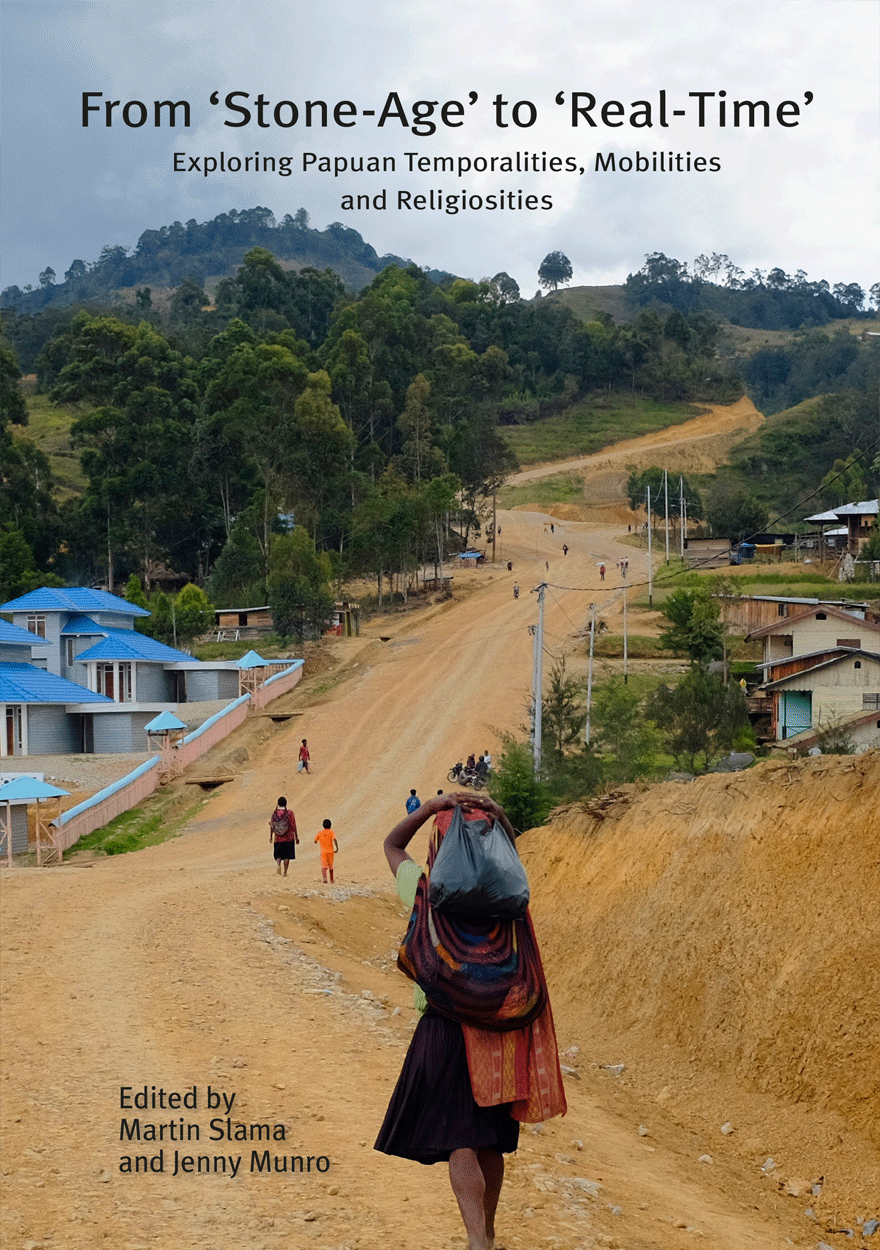
From 'Stone-Age' to 'Real-Time' »
Exploring Papuan Temporalities, Mobilities and Religiosities
Edited by: Martin Slama, Jenny Munro
Publication date: April 2015
There are probably no other people on earth to whom the image of the ‘stone-age’ is so persistently attached than the inhabitants of the island of New Guinea, which is divided into independent Papua New Guinea and the western part of the island, known today as Papua and West Papua. From ‘Stone-Age’ to ‘Real-Time’ examines the forms of agency, frictions and anxieties the current moment generates in West Papua, where the persistent ‘stone-age’ image meets the practices and ideologies of the ‘real-time’ – a popular expression referring to immediate digital communication. The volume is thus essentially occupied with discourses of time and space and how they inform questions of hierarchy and possibilities for equality. Papuans are increasingly mobile, and seeking to rework inherited ideas, institutions and technologies, while also coming up against palpable limits on what can be imagined or achieved, secured or defended. This volume investigates some of these trajectories for the cultural logics and social or political structures that shape them. The chapters are highly ethnographic, based on in-depth research conducted in diverse spaces within and beyond Papua. These contributions explore topics ranging from hip hop to HIV/ AIDS to historicity, filling much-needed conceptual and ethnographic lacunae in the study of West Papua.
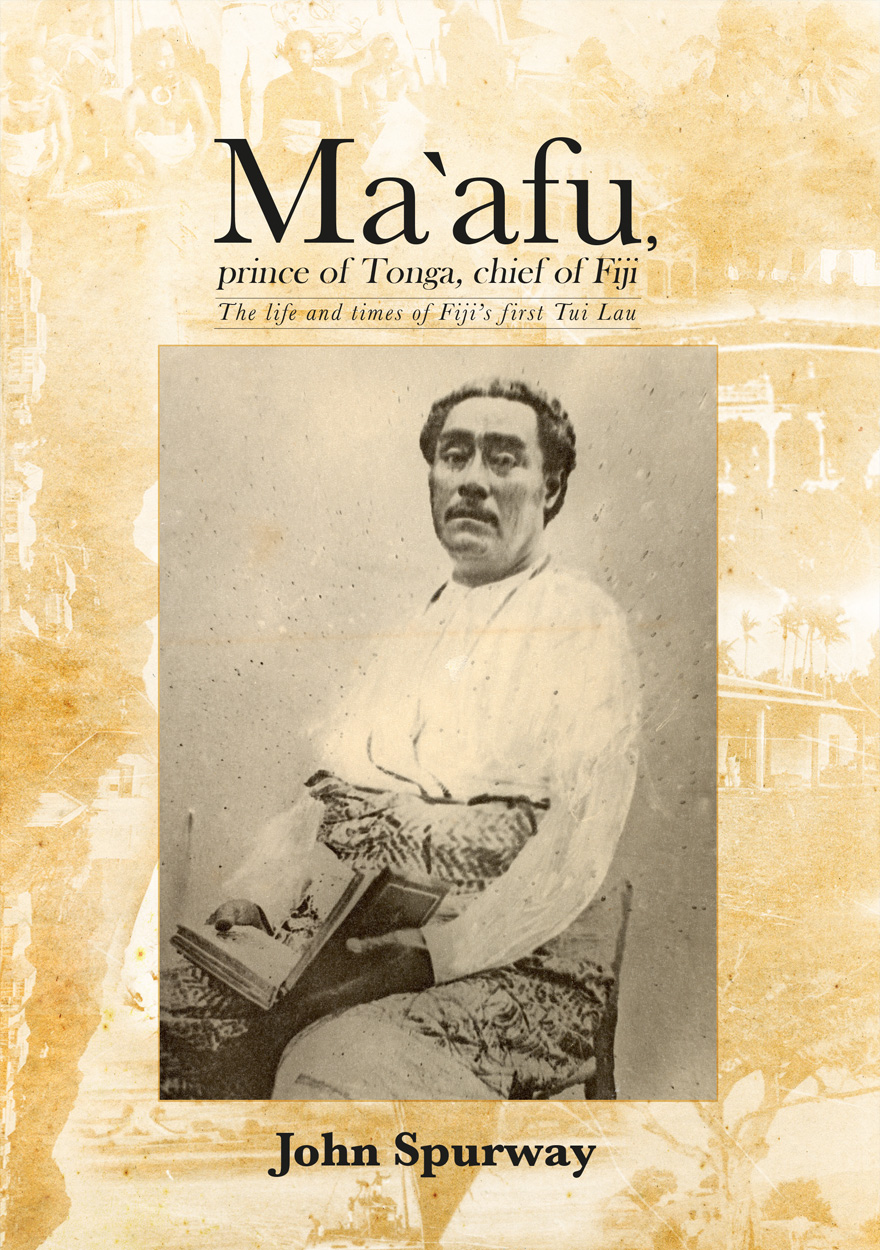
Ma`afu, prince of Tonga, chief of Fiji »
The life and times of Fiji’s first Tui Lau
Authored by: John Spurway
Publication date: February 2015
Enele Ma`afu, son of Aleamotu`a, Tu`i Kanokupolu, grew up during a time of unprecedented social and political change in Tonga following the advent of Christianity. Moving to Lau, Fiji, in 1847 when he was about 21, he skilfully exploited kinship links to establish a power base there and in eastern Cakaudrove. His achievements were recognised in 1853 when his cousin King Tupou I appointed Ma`afu as Governor of the Tongans in Fiji.
Acting as a putative champion of the lotu, Ma`afu undertook successful military campaigns elsewhere in Fiji and, after adding the Yasayasa Moala and the Exploring Isles to the nascent Lauan state, he was able to establish the Tovata ko Lau, a union of Lau, Cakaudrove and Bua, with himself as head. His power was formally recognised in 1869 when the Lauan chiefs appointed him as Tui Lau, a new title in the polity of Fiji. Ma`afu was now able to challenge Cakobau for the mastery of Fiji.
After serving as Viceroy during the farcical planter oligarchy known as the Kingdom of Fiji, Ma`afu underwent a severe humiliation when, in order to maintain his power in Lau, he was forced to accede to the wishes of Fiji’s other great chiefs in offering their islands to Great Britain. He would end his days as Roko Tui Lau, a ‘subordinate administrator’ in the Crown Colony of Fiji, presiding over a province characterised by corruption and maladministration but where the legacy of his earlier innovative land reforms has endured.



